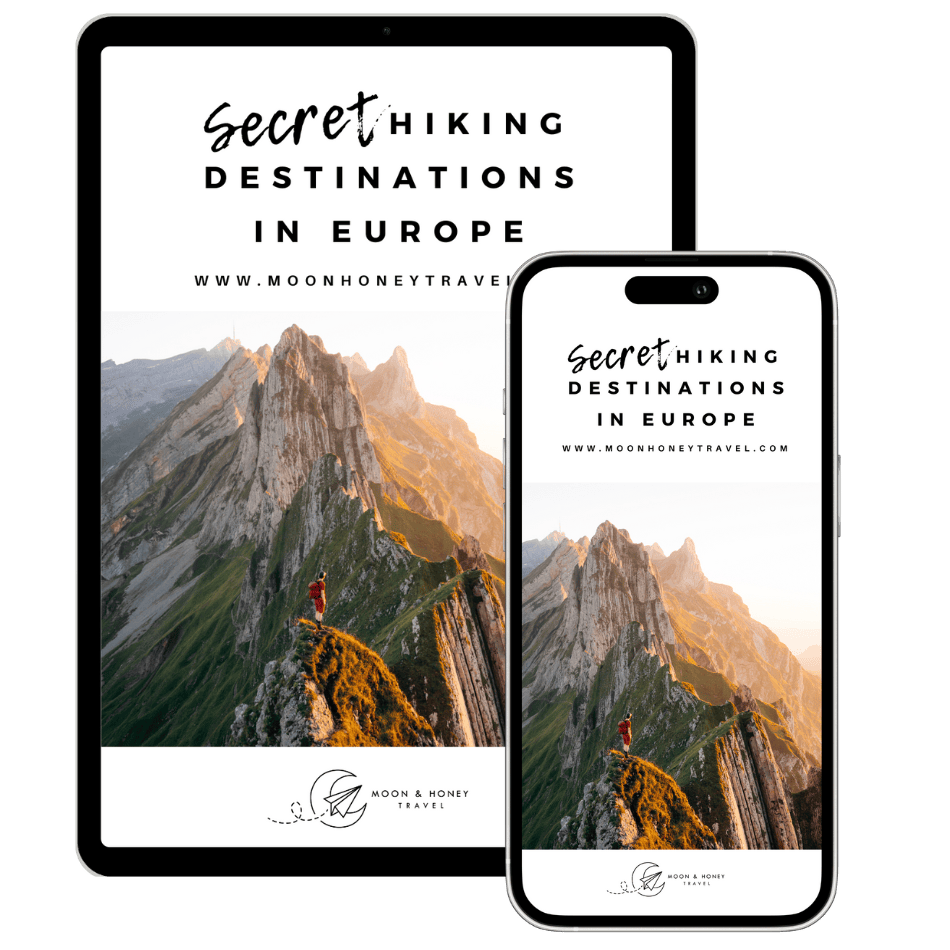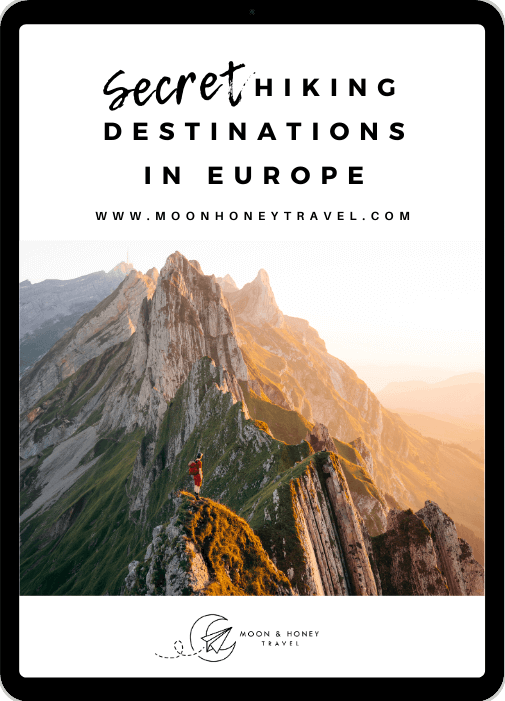The Italian Dolomites caters to all types of travelers and travel styles.
Whether you’re on a budget, traveling with small children, planning a multi-day hike, or splurging on a grand anniversary trip or honeymoon, this Dolomites accommodation guide will help you plan your trip.
We’ve visited the Dolomites many times and have stayed in farms, apartments, wellness hotels, campgrounds, and mountain huts. Each type of accommodation has its own benefits and limitations.
In this guide, we’ll outline all your Dolomites accommodation options, so you can choose what’s right for you.
You’ll also learn how to book farm stays, mountain huts, and other unique places to stay.
If you’re trying to figure out which villages and towns to stay in, read Where to Stay in the Dolomites.
If you’re interested in staying in boutique and luxury hotels, read Best Hotels in the Dolomites.
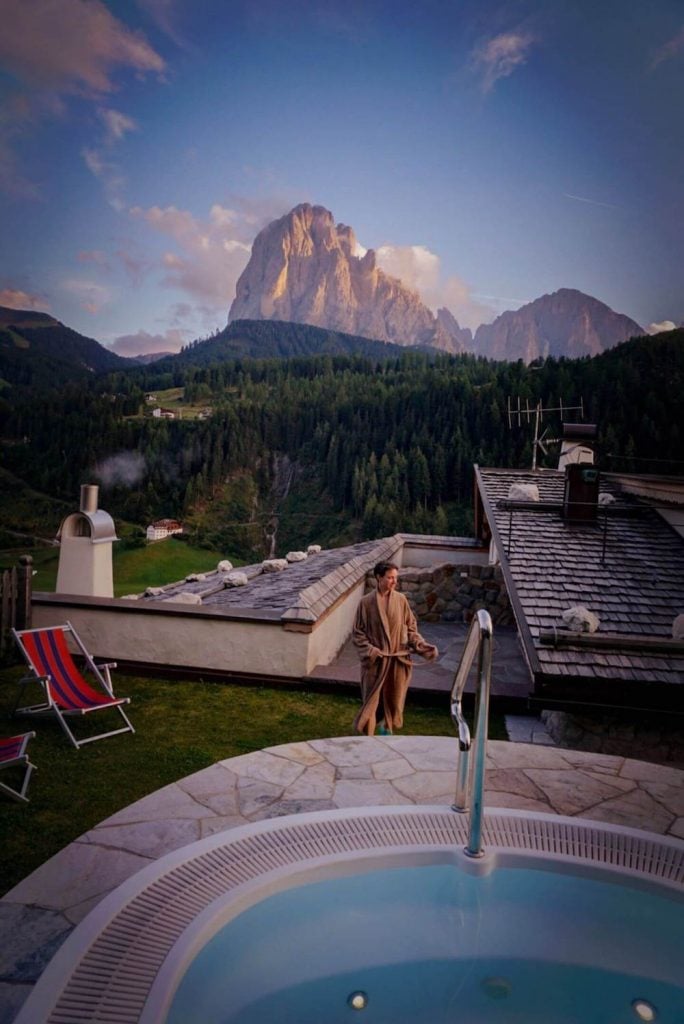
- Many accommodations in the Dolomites require a minimum stay of three or four nights. During high season, some hotels may increase the minimum stay requirement to 5 or even 7 days.
- The Dolomites stretch across 5 provinces in northeastern Italy: South Tyrol (Südtirol/Alto Adige), Trentino, Belluno, Udine and Pordenone. The best Dolomites accommodations are concentrated in the province of South Tyrol. Here, you’ll find the finest wellness and spa hotels.
- Book as early as possible. People plan annual trips to the Dolomites, booking a year ahead.
- Many hotels offer half board, where breakfast and dinner are included in the rate. If you’re traveling in shoulder-season/off-season, we highly recommend choosing a hotel with an on-site restaurant, or half-board offering.
- If you want maximum flexibility, we recommend staying in an apartment, or an aparthotel, with a fully-equipped kitchen.
- You can only camp in official campgrounds in the Dolomites. Wild camping is strictly prohibited.
- The most budget-friendly accommodations are farm stays and Pensionen (guesthouses).
- There is a high standard of hygiene in the Dolomites. So no matter the price point, you can expect clean accommodations.
Dolomites Accommodation Map
How to use this map | Click on each accommodation icon to display further information. Each color signifies a different Dolomites destination.
Dolomites Rifugios
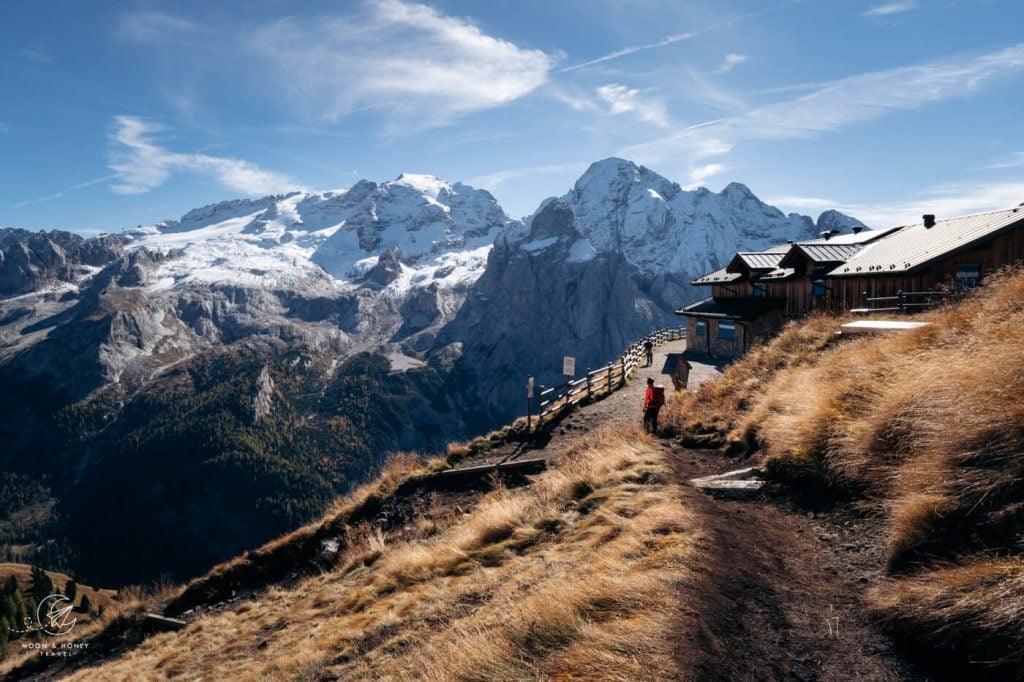
A Rifugio is a high-elevation mountain hut, situated directly on a hiking trail. These mountain refuges are staffed and offer hikers a warm place to sleep as well as food and drinks.
Most Rifugi are only accessible by foot, though there are exceptions (e.g. Rifugio Auronzo). Many huts are easy to reach, due to nearby cableway connections. For example, it’s a 20 minute walk from the Col Raiser Gondola mountain station to Rifugio Firenze.
Note: the plural of Rifugio in Italian is Rifugi, but English speakers commonly say Rifugios. In German-speaking South Tyrol, a Rifugio is called a Hütte.
There is a vast network of mountain huts across the Dolomites, making multi-day hiking extremely accessible. You can spend your whole trip in the Dolomites hiking from one hut to another.
These mountain huts range from very rustic, offering only the most basic amenities, to semi-luxurious. It’s important to realize that these Rifugios are first and foremost refuges for hikers, climbers and mountaineers.
They are not “mountain hotels.” Bathroom facilities are always shared, showers aren’t always available, and rooms are typically dormitory-style.
Upscale Rifugios in the Dolomites
If you’re someone who is looking for the experience of staying in a high-elevation refuge, but who also craves the comforts of a hotel (e.g. ensuite bathroom, private bedrooms), we recommend these upscale Rifugios:
Ütia de Börz is located at Passo delle Erbe, accessible by car from Alta Badia and Val di Funes. This excellent refuge facing Sass de Putia has private rooms with ensuite bathrooms. Their half board dinner menu is outstanding. We stayed here before/after hiking the Sass de Putia circuit trail.
Hut to Hut Routes
You can follow an established route like the famous Alta Vie (High Routes), or if you’re an experienced trekker, create your own route. We’ve done both.
If you’re new to hut to hut hiking, we highly recommend sticking to an established route and following a day by day itinerary in a guidebook:
Trekking in the Dolomites: Alta Via 1 And Alta Via 2 With Alta Via Routes 3-6 In Outline
Walking in the Dolomites: 25 Multi-day Routes in Italy’s Dolomites
Read Next: Hut to Hut Hiking in the Dolomites
When to Stay in a Dolomites Mountain Hut

Rifugios are typically open from late June until late September. Some huts will stay open in October, but only very few. We wrote about which huts stay open in Fall in Hiking in the Dolomites in October.
Some huts are also open in winter and host ski mountaineers.
When to Book Rifugios
It’s important to make reservations for mountain huts in the Dolomites at least 3-5 months in advance. For popular routes, we recommend booking 5 months in advance.
How to Book Rifugios

There is no uniform system for booking Rifugios. To find out how to book a specific Rifugio, simply Google the name of the Rifugio and click on the hut’s website. From here, you can quickly find out how to make a reservation.
Some huts will ask you to submit a reservation request form online. Other rifugio websites aren’t very sophisticated and only have a few contact details.
In cases like these, I’d first email the hut first. If you don’t get a response in a few days, you can follow-up with a call. We use Skype credits (pay as you go), to make international phone calls.
Important: some Rifugios along popular trails require deposits to secure your reservation.
You can also book a self-guided hiking tour with a trustworthy company like Alpenventures UNGUIDED.
They take care of all the logistics and you get to hike independently. We recommend this Best of the Dolomites Trek 9-day Standard self-guided tour, which runs west to east from Seceda to Tre Cime di Lavaredo. You can also book the AV1-10 Alta Via 1 Self Guided (10 stages), AV1-7 Alta Via 1 Self Guided (7 stages), or AV1-4 Alta Via 4 Self Guided (4 stages).
Alpine Club Member Discounts
Generally, Rifugi in the Dolomites are either owned by the Italian Alpine Club (Club Alpino Italiano – CAI) or the South Tyrol Alpine Club (Alpenverein Südtirol – AVS).
CAI or AVS-owned huts will administer a discount to members of UIAA alpine clubs that participate in the International Reciprocal Agreement on Mountain Huts (e.g. DAV, ÖAV, SAC, CAF). If you want to learn more about joining a UIAA alpine club, read Tips for Hiking in the Alps.
However, many huts are also privately owned and managed. These huts will not give alpine club members discounts on overnight stays.
Rifugio Essentials
Sleeping Bag Liner like this lightweight silk liner or this Cocoon Cotton liner
Waterproof House Slippers. We always bring our Crocs to wear in the huts. Crocs are great because they’re waterproof (perfect for showering), lightweight, and suitable for sock-wearing (unlike flip flops). Note: many huts provide slippers, but do you really want to wear communal slippers?
Reusable Water Bottles. You can fill up your water in most huts for free. If the tap water isn’t drinkable in the hut, there will be a sign. We both carry two 1-Liter water bottles each.
E-reader. There’s always ample time to read before dinner, or before bed. We always download a few books on our Kindle before a hiking trip.
Learn More: Hut to Hut Hiking Packing List
Dolomites Farm Stays

A farm stay (Agriturismo / Urlaub am Bauernhof) is a fantastic option for families as well as travelers on a budget. Farms are super down-to-earth accommodations, perfect for anyone who wants to be close to nature and farm animals.
We’ve stayed in several Roter Hahn Farm Stays in the Dolomites. The hosts were hospitable, the rooms were clean, and the prices were very economical.
Roter Hahn (Red Rooster) is a trademark given to farmhouses in South Tyrol that provide quality holiday accommodations. There are 1,600 Roter Hahn farms across the province.
The goal of Roter Hahn is to put people in touch with the rural world of South Tyrol. Another objective is to help farmers establish another occupation and stream of income.
Depending on the farm, you can opt for overnight stay only, bed and breakfast, or half board (breakfast and dinner).
Many of these farms also sell their own products.
To look for farm stays, use the Roter Hahn website. There’s a form, next to each farmhouse page, that lets you reach out and request a reservation. If the farmhouse has availability for the date(s) given, they’ll reach out to you via email.
Here are some farm stays you can book easily on Booking.com:
Proihof in Val di Funes
Untertalhof in Castelrotto
Agriturismo Maso Runch in Badia
Agriturismo Feur Hof in San Martino in Badia
Lüch dl Kessl in San Martino in Badia
Agriturismo Anví in Badia
Dolomites Apartments with Fully-Equipped Kitchens
The Dolomites have two primary seasons: winter and summer. Many hotels, restaurants, and shops are closed in fall (November) and spring (April / May).
A self-catering accommodation is the best option for anyone traveling to the Dolomites off-season, or during shoulder season. Alternatively, you can stay in a hotel with half board (breakfast and dinner) – more on that later.
If you’re visiting the Dolomites in October, for example, most mountain huts and alpine pasture huts will be closed. That means that you’ll have to pack your lunch with you on any hikes and excursions.
If you stay in a self-catering apartment, you can prepare your lunch, as well as all your other meals.
Ultimately, apartments give you the most flexibility. You don’t have to schedule your day around strict dinner and breakfast times. You can start your day as early as you want.
For anyone photographing sunrises and sunsets, an apartment is your best Dolomites accommodation option. We stayed in an apartment in San Martino di Castrozza, so that we could start hiking as early as possible, to avoid the crowds.
Furthermore, with the ability to cook your own meals, you’ll save a lot of money.
Aparthotels
There are also many aparthotels in the Dolomites. In these accommodations, you get the benefits of an apartment (e.g. kitchen) with the amenities of a hotel (e.g. wellness and spa facilities, on-site restaurant).
Many aparthotels offer breakfast, and sometimes even dinner.
Here are some excellent aparthotels across the Dolomites:
Luxury Family Aparthotel in Alta Badia | Movi Family Apart-Hotel offers new and stylish apartments for families. This modern property blends everything we love about a hotel (amenities and breakfast buffet) with everything we love about an apartment (self-sufficiency and space). Extra Perks: kids and family spa area with pool, adults-only spa, summer outdoor playpark, entertainment for kids.
Luxury Aparthotel in Alta Badia | Lagacio Hotel Mountain Residence is an excellent 4 star aparthotel in San Cassiano. You’ll love the spacious apartments, breakfast, spa area, and bar.
Luxury Aparthotel in Alta Pusteria | ATTO Suites & Cuisine is a new luxury aparthotel in San Candido, furnished with the highest quality local materials. These gorgeous, minimalist apartments teeter stylistically between Alpine and Nordic. An excellent breakfast is included (with gluten-free options). Other included services: parking, shuttle service to the Leitlhof spa, and bicycle storage room.
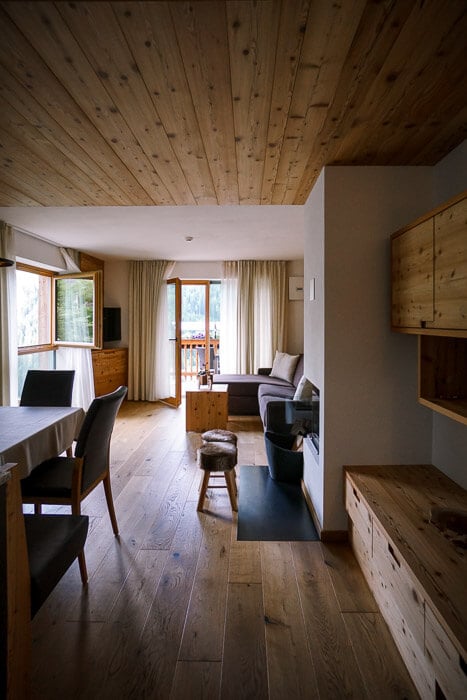
Lüch de Costa
Upscale Aparthotel in Colfosco, Alta Badia
Lüch de Costa is a historical Ladin farmstead, which was converted into several high-end apartments in 2017. This unique accommodation is perfect for anyone who wants the independence of an apartment, but the convenience and finer features of a hotel. This is perfect place to stay if you’re traveling in early summer, or late Fall (shoulder seasons).
The apartment kitchens are outfitted with premium Miele appliances, including an oven, stove, dishwasher, and refrigerator. There’s ample granite countertop space and every possible cooking utensil you’d need to feel right at home.
Guests also have access to a fine wellness area with an indoor pool, outdoor whirlpool, steam sauna, bio sauna, Finnish sauna, and waterbeds.
Best Apartments in Alta Pusteria, South Tyrol
Budget: Residence Kugler in San Candido
Budget: Residence Silvia in San Candido
Luxury Aparthotel: Aparthotel Gamz in Sesto
Luxury Aparthotel: ATTO Suites – Appartements in San Candido
Related: Alta Pusteria Travel Guide
Best Apartments in Alta Badia, South Tyrol
Budget: Residence Ploner in San Cassiano
Budget: Appartamenti Genzian in La Villa
Midrange: Lüch Picedac in La Valle
Midrange: Lüch dl Jëinder in San Martino in Badia
Midrange: Nei Y Suredl NeveSole in Corvara
Luxury Aparthotel: Lüch de Costa in Colfosco
Luxury: Residence Ciasa Vedla in Badia
Luxury: Les Dolomites Mountain Lodges in San Martino in Badia
Luxury Aparthotel: Lagació Hotel Mountain Residence in San Cassiano
Related: Alta Badia Summer Guide
Best Apartments in Val Gardena, South Tyrol
Budget: Residence Merk in Selva
Budget: Villa Scherlin in Ortisei
Budget: Appartamenti Olympic in Santa Cristina
Midrange: Appartamento Dolomiti in Selva
Midrange: Schoenau Bio & SPA Family Apartments in Ortisei
Midrange: Apartments Cesa Ploner in Ortisei
Midrange: Residence Prapoz in Ortisei
Luxury: Mountain Apartments Gran Tubla in Ortisei
Luxury: Residence Isabell in Selva
Related: Best Hikes in Val Gardena
Related: Ortisei Travel Guide
Best Apartments in San Martino di Castrozza, Trentino
Budget: Residence Taufer
Midrange: Ski Residence
Midrange: Historic Residence Madonna
Luxury: Residence Langes
Best Apartments in Cortina d’Ampezzo, Belluno
Budget: Attico Castello
Luxury: Dolomiti Sweet Lodge
Luxury: Villa Lieta
Aparthotel Radisson Residences Savoia Palace Cortina d’Ampezzo
We loved staying in Fiori Dolomites Experience Hotel, an aparthotel and B&B in San Vito di Cadore (20 min drive to Cortina). This extremely well-priced accommodation features an in-house patisserie.
As a guest, you’ll get to taste their delicious pastries at breakfast and in the afternoon at the complimentary snack bar.
Related: Cortina d’Ampezzo Travel Guide
Alpine Pasture Huts
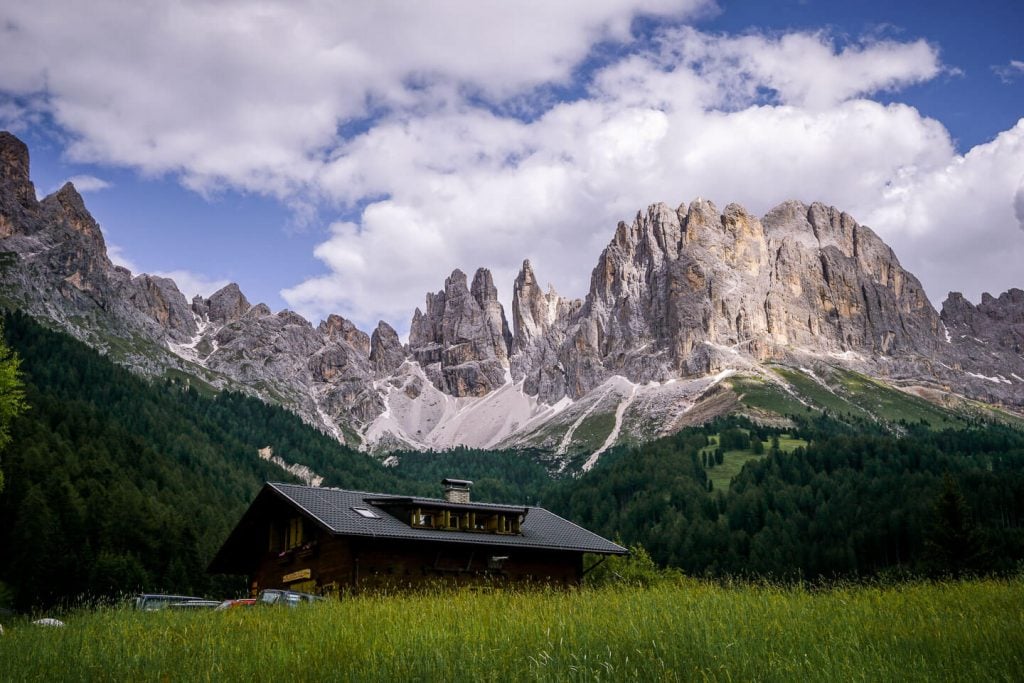
Across the Alps, livestock (cows, goats, and sheep) are seasonally moved to higher elevation mountain pastures in summer and to lower elevation valley pastures in the winter.
During the summer months herdsmen stay in huts on mountain pastures in order to take care of their livestock.
While traditional alpine farming (“alpine transhumance”) is no longer as prevalent as it once was, there are still many active alpine pastures across the Dolomites. And, there are MANY alpine pasture huts.
Today, many of these huts are managed and function as rustic mountain restaurants, serving food and drinks to hikers and cyclists during the day. Some of these huts still produce their own cheese and dairy.
Unlike a Rifugio (mountain shelter), alpine pasture huts (Malga, Baita, Alm, Almhütte, Schwaige) usually don’t offer overnight lodging.
But, there are a smattering of mountain pasture huts that accommodate overnight guests, if you know where to look.
Plafötschalm
Plafötschalm is a family-run mountain pasture hut situated at an elevation of 1570 meters in Tiers am Rosengarten/Tires al Catinaccio, South Tyrol.
More intimate and relaxed than a classic Rifugio, Plafötschalm is a great option for families with children, or anyone who wants to unwind in an idyllic alpine location.
Plafötschalm allows guests to soak in the brilliant Catinaccio/Rosengarten and Latemar Dolomites scenery in a remote place, only accessible by foot.
We recommend staying here if you like the idea of a classic mountain hut (Rifugio, Hütte), but you want more privacy and less commotion. The hut has 5 double rooms (“Doppelzimmer”) and 1 shared room (“Mehrbettzimmer”). Each double room has its own ensuite bathroom and shower.
All guests receive half board (breakfast and dinner). All meals are homemade and prepared using fresh and regional ingredients. The food is simple and traditional, but nonetheless tasty. If you have any dietary restrictions, it’s important to communicate your needs in advance.
During our stay, we hiked from Plafötschalm to Malga Hainger Schwaige and Messner Schwaige (Trails 7, 15). At Frommeralm, we hopped on a bus (free with our guest pass), back to the Plafötsch road/trail intersection.
More things to know:
- Open: May – October
- Arrival: You can get a pick-up from the road (46.468514, 11.578427), if you call in advance. Otherwise, you can walk up from the small parking area in 30-40 minutes.
- We recommend staying 1-2 nights. There aren’t a lot of (officially marked) hikes you can do directly from the hut, so it doesn’t make sense to stay longer.
- You’ll receive a Südtirol Alto Adige Guest Pass (Mobilcard) free of charge. This gives you free use of transit during your stay.
- On trail signs, Plafötschalm is also spelled “Plafetsch Alm.”
Book your stay at Plafötschalm.
Dolomites Campgrounds
Camping is only allowed on official campgrounds and designated camping areas. Wild camping is strictly prohibited in the Dolomites.
There is a lot of misleading information online and on social media regarding wild camping in the Dolomites. We implore you to abide by the rules. If you want to stay overnight in the mountains, stay in the mountain huts.
We stayed in the guesthouse at Camping Sass Dlacia (1680 m), which is the highest elevation campground in the Dolomites.
This campground in San Cassiano, Alta Badia, has its own wellness center and excellent pizzeria. It’s located directly at the entrance to Fanes-Sennes-Braies Nature Park.
Best Campgrounds in the Dolomites
Caravan Park Sexten: campground and bungalows and treehouses
Campsite Seiser Alm close to the Alpe di Siusi Plateau
Camping Toblacher See at Lago di Dobbiaco
Camping Catinaccio Rosengarten in Pozza di Fassa, Val di Fassa
Steiner Camping Park near Bozen / Bolzano
Camping Al Plan, San Vigilio di Marebbe, Val Badia, at the entrance of the Fanes-Senes-Braies Natural Park
Dolomites Spa Hotels
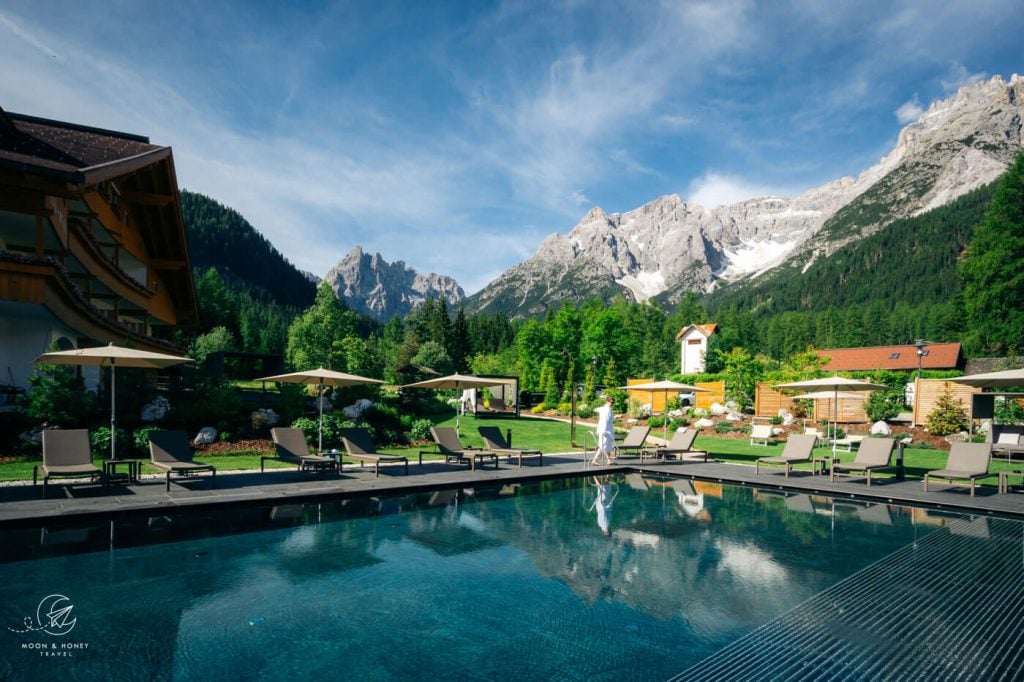
We love staying in hotels in the Dolomites.
As a general rule, you’ll find the best hotels in South Tyrol.
Many hotels are themed. For example, you’ll find adults-only wellness hotels, hiking hotels, bio hotels, gourmet hotels, etc…
Here are some compelling reasons for staying in hotels.
Half Board
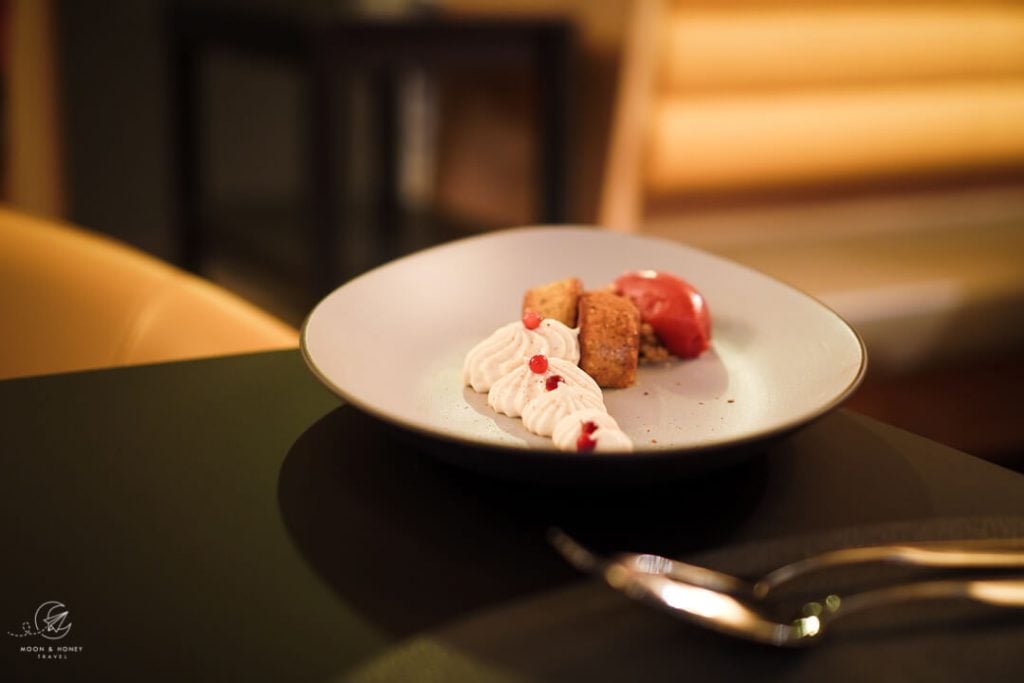
Hotels offer greater comfort and amenities than other types of accommodation. While sometimes we really like the flexibility of an apartment, most times we prefer the convenience of a hotel, especially when it comes to food.
Many hotels offer half board (breakfast and dinner) with unique daily menus. This is the most relaxing option. You don’t have to think about and plan where you’re going to eat every day.
Sometimes breakfast and dinner times are restrictive. For most travelers, those times are consistent with when you want to eat anyway.
However, very active hikers/climbers (e.g. who want to start hiking at 6 am) and photographers (e.g. who want to capture Enrosadira), may not want those time limitations.
There are many gourmet hotels in the Dolomites. From our personal experience, we can highly recommend Dorfhotel Beludei in Santa Cristina, Val Gardena, and Naturhotel Leitlhof in San Candido, Alta Pusteria.
Spa Facilities
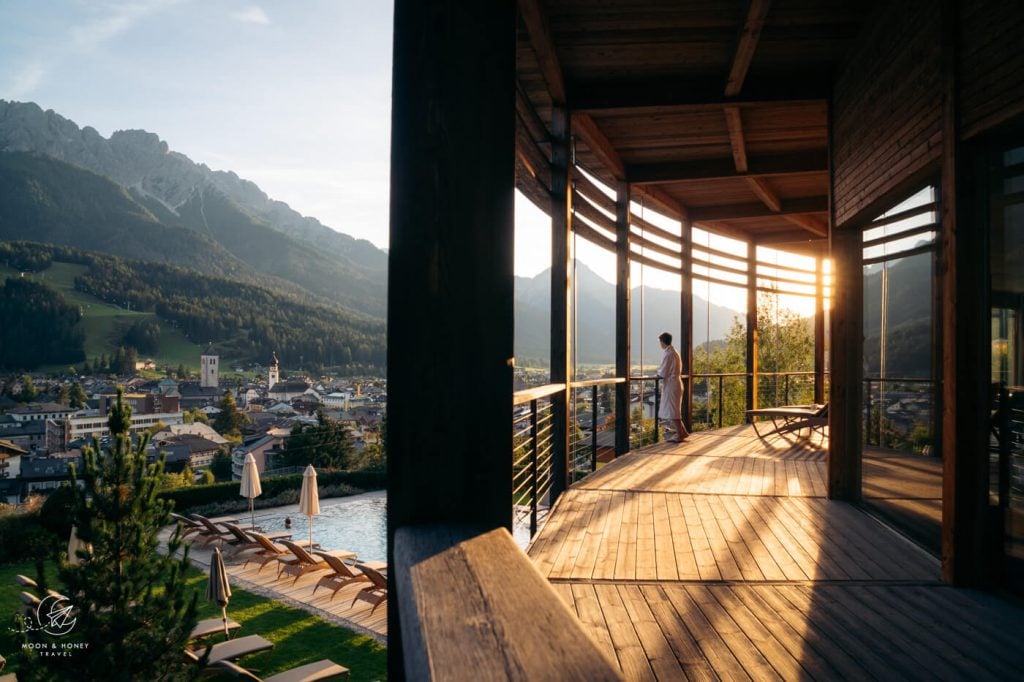
At a minimum, many hotels have a steam sauna, a Finnish sauna, and a relaxation room. Wellness hotels will often comprise 4-5 different saunas, a hot tub, 1-2 pools, and several relaxation rooms. Additionally, many of these hotels offer alpine spa treatments.
Why on earth would someone want to spend time in a sauna when you’re in one of the most beautiful places on earth?
Weather. In the Dolomites, like everywhere else in the European Alps, weather isn’t consistently good. There will always be a rainy day, or a few.
If you come to the Dolomites and you experience several days of rain (we certainly have), you’ll feel kinda devastated. But, if you stay in a wellness hotel, those rainy days become rejuvenating spa days.
In winter, it’s part of the skiing culture to head to the sauna after a day on the slopes. In summer, it’s equally enjoyable. If you’ve been hiking all day, your body will feel restored after a few sauna sessions.
Sauna Etiquette
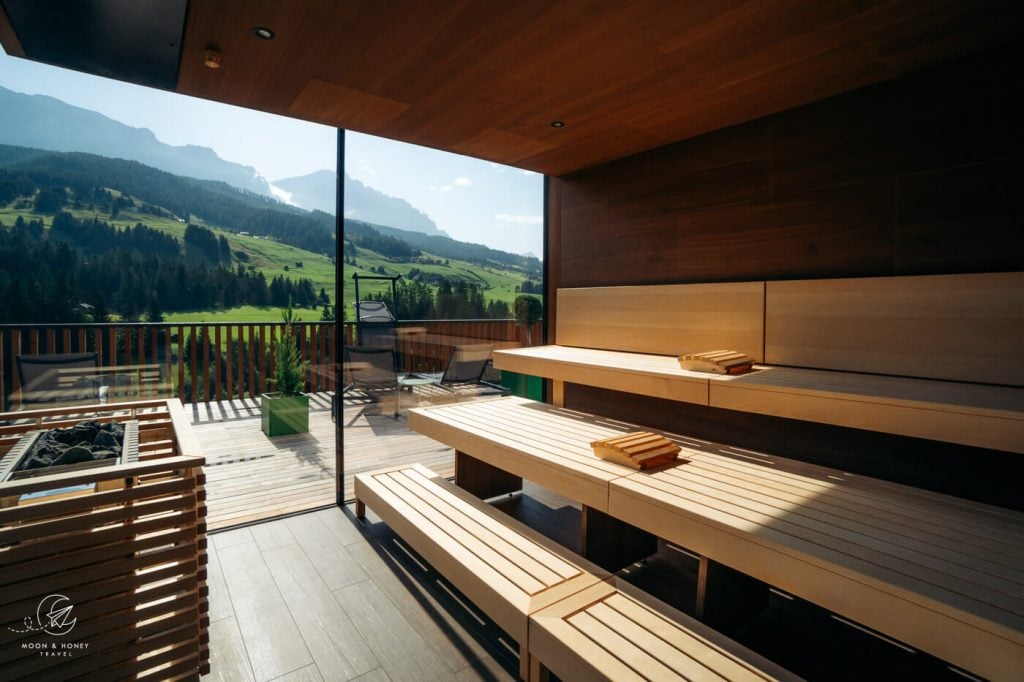
In the Dolomites, you’ll experience a clash of cultures in the sauna areas. In South Tyrol, abide by Austrian and German sauna etiquette.
Do not wear a bathing suit into the sauna. In dry saunas, make sure your body doesn’t touch the wood. Always place a towel beneath you. This is the most hygienic way “to sauna.”
In the other provinces, where Italian culture is more dominant (they don’t like being naked), you’ll find a mix of people wearing/not wearing bathing suits. Just follow the rules of each hotel.
Excellent Spa and Wellness Hotels in the Dolomites
Wellness Hotels in Val Gardena
Alpin Garden Luxury Maison – Adults Only in Ortisei
Hotel Gardena Grödnerhof in Ortisei
La Cort My Dollhouse – Adults Only in Ortisei
Hotel Granbaita Dolomites in Selva
Hotel Tyrol in Selva
Related: Best Hotels in Val Gardena
Wellness Hotels in Alta Badia
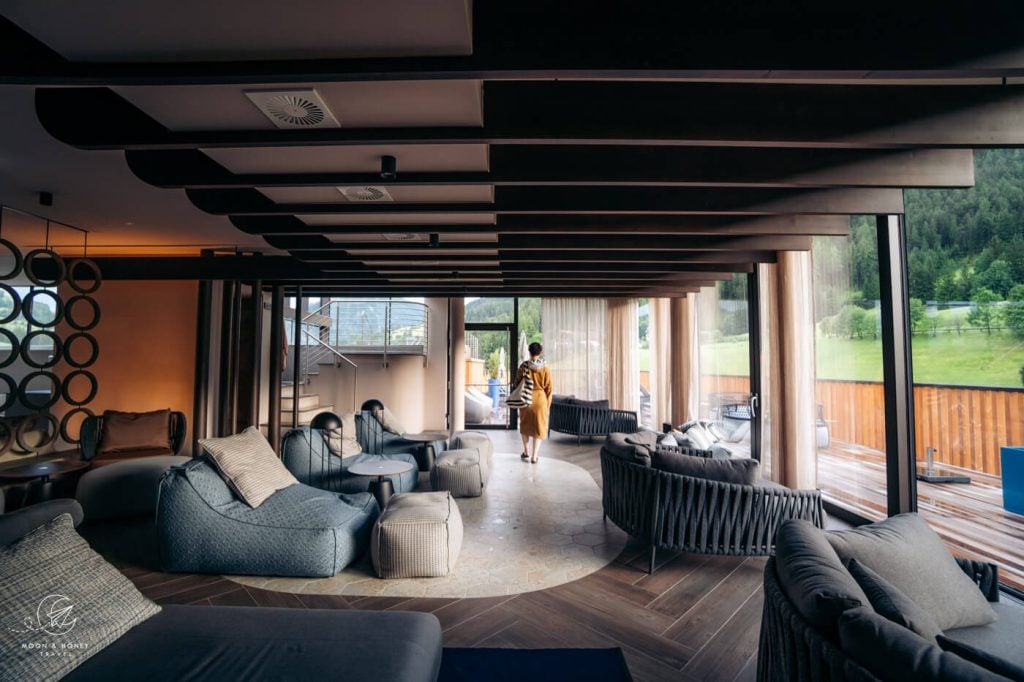
Hotel Cristallo – Wellness Mountain Living in La Villa
Hotel Kolfuschgerhof in Colfosco
Hotel Col Alto in Corvara
Romantik Hotel Capella in Colfosco
Hotel Badia Hill in Badia. Read our Badia Hill hotel review.
Wellness Hotels on Alpe di Siusi
Hotel Rosa Eco Alpine Spa Resort
Wellness Hotels in Castelrotto
Spa Hotels in Alta Pusteria
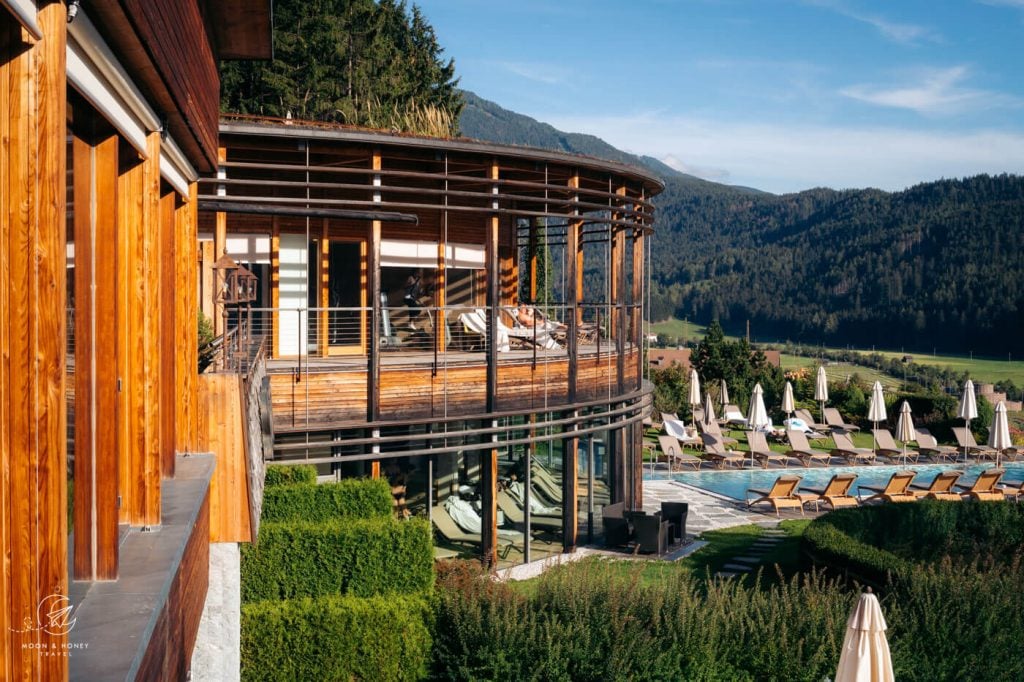
Bad Moos Dolomites Spa Resort in Sesto
Hotel Monika in Sesto
Naturhotel Leitlhof in San Candido. Read our Naturhotel Leitlhof hotel review.
Wellness Hotels close to Brixen
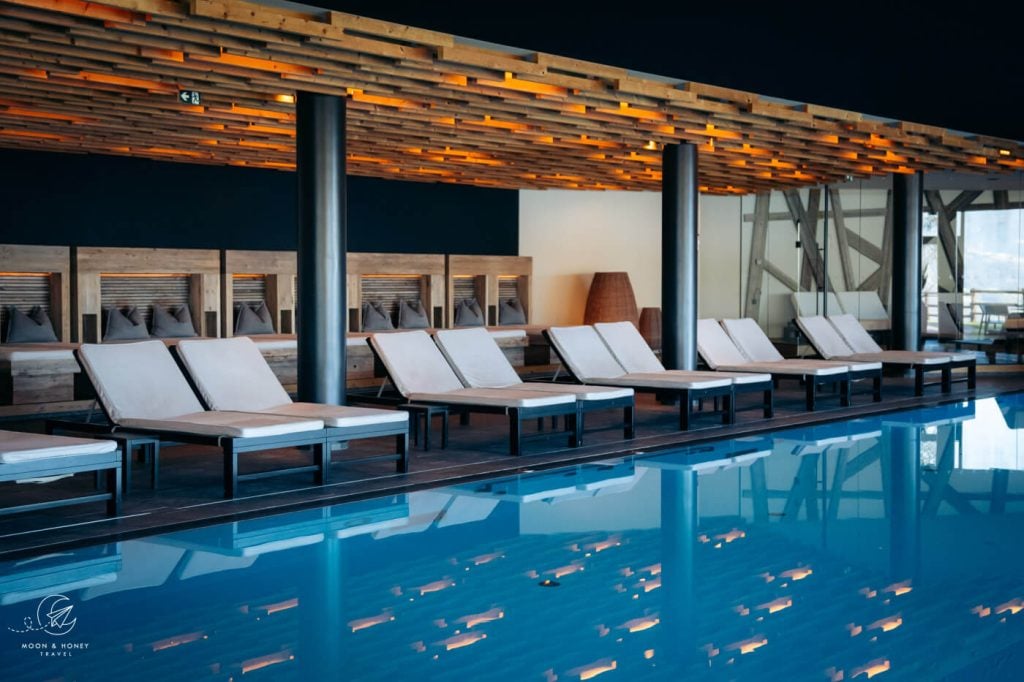
My Arbor – Plose Wellness Hotel. Read our My Arbor hotel review.
Wellness Hotels in Cortina d’Ampezzo
More excellent hotels in Cortina d’Ampezzo: HOTEL de LEN and Camina Suite & Spa, both of which have spa areas.
Wellness Hotels in Pinzolo (Brenta Dolomites)
Hotel Lefay Resort & SPA Dolomiti
Dolomites Hotels with Infinity Pools
Alpin Panorama Hotel Hubertus in Olang, Val Pusteria
Hotel Fanes in San Cassiano, Alta Badia
Hotel Monika in Sesto, Sesto Valley
Charmehotel Uhrerhof – Deur in Ortisei, Val Gardena
Forestis Dolomites in Brixen
Gloriette Guesthouse in Oberbozen
Hotel Pfösl in Nova Ponente
Tratterhof – Mountain Sky Hotel in Maranza
Hotel Winkler Sport & Spa Resort in San Lorenzo
Complimentary Hiking and Cycling Guided Excursions
Another benefit of staying in a hotel are the extra services. Many hotels like Naturhotel Leitlhof and Dorfhotel Beludei offer complimentary guided hiking, cycling, and walking excursions.
If a hotel has an active focus, they may also provide gear you can borrow, or rent. These hotels are typically called “Sport Hotels.”
Here are some excellent sports hotels in the Dolomites:
Sporthotel Sonne on Seiser Alm
Sporthotel Alpenrose in Carezza
Sporthotel Floralpina on Seiser Alm
Artnatur Dolomites Hotel & Spa in Seis
Adults-Only Hotels
In the Dolomites, there are hotels for adults only.
Whether you’re taking a vacation without the kids, or you’re someone who doesn’t relish the company and many sounds of children, consider staying in an adults-only hotel.
Gartenhotel Voelser Hof Adults Only in Fié allo Sciliar, between Tires and Seis
Chalet Hotel Hartmann – Adults Only in Ortisei, Val Gardena
Alpin Garden Luxury Maison – Adults Only in Ortisei, Val Gardena
La Cort My Dollhouse – Adults Only in Ortisei, Val Gardena
Post Hotel – Tradition & Lifestyle – Adults Only in San Candido, Alta Pusteria
Forestis Dolomites in Brixen
Dolomites Trip Planning Essentials
Use our Dolomites Travel Guide to plan an unforgettable trip to Northern Italy.
When to Hike in the Dolomites
Winter Season. For skiing and winter activities, the best time to visit is between mid/late December and March.
Summer and Fall Seasons. The best time to road trip and hike in the Dolomites is between mid-June and mid-September. If the weather is stable, the hiking season can easily continue until late October.
Spring Season. We don’t recommend visiting the Dolomites in early spring. Read: May in the Dolomites.
How to Get to the Dolomites
Read How to Get to the Dolomites to find out how to travel to the Dolomites from the closest airports, train stations, and bus terminals.
If you’re traveling without a car, also check out How to Visit the Dolomites Without a Car.
Car Rental
The easiest way to travel between hiking destinations in the Italian Dolomites is with your own car. Check out our itineraries for trip inspiration:
We recommend using the Discovercars.com car rental reservation platform to search for and book car rentals. This easy-to-use booking platform compares car rental deals from 500+ trusted providers, so that you can choose the best option for your trip.
Tip: If you can only drive automatic transmission cars, as opposed to manual transmission cars (stick shift), book your car rental as early as possible.
Best Places to Stay
Figuring out where to stay in the Dolomites is probably the biggest hurdle to planning a trip to the Dolomites. We’ve created three guides to help you decide where to stay:
- Where to Stay in the Dolomites in Summer: best villages and towns in South Tyrol, Trentino and Belluno
- Best Hotels in the Dolomites: best boutique and luxury hotels in the Dolomites
- Best Val Gardena Hotels: best accommodations in Ortisei, Santa Cristina, and Selva di Val Gardena
We suggest choosing 2-4 bases for your Dolomites trip and spending 2-4 nights in each base.
- Base 1: Val Gardena
- Base 2: Val di Funes
- Base 3: Alta Badia
- Base 4: Cortina d’Ampezzo
- Base 5: Alta Pusteria
- Base 6: San Martino di Castrozza
- Base 7: Val di Fassa
What to See & Do
During your trip to the Dolomites, you can go via ferrata climbing, culinary hiking, hut to hut hiking, cycling, paragliding, and so much more. We’ve highlighted our favorite experiences in Best Things to Do in the Dolomites.
Wherever you decide to stay, you’ll be surrounded by glorious mountain scenery and incredible natural landmarks.
In Best Places to Visit in the Dolomites, we’ve outlined the most iconic attractions as well as lesser-known destinations across the Dolomites, including Alpe di Siusi, Lago di Braies, and Lago di Sorapis.
Dolomites Packing List
Hiking Gear
- Day Pack: Osprey Tempest 30 Women’s Backpack / Osprey Talon 33 Men’s Backpack
- Grade B/C high-cut hiking boots: Meindl Schuhe Island Lady (Kati’s Boots), Women’s Hanwag Tatra II GTX (Sabrina’s Boots), Men’s Hanwag Tatra II GTX (men’s equivalent)
- CAT 4 Sunglasses: Julbo Shield Mountain Sunglasses
- Hiking Poles: Black Diamond Trail Trekking Poles
Outdoor Photography Gear
- Camera Body: Sony Alpha a6400
- Mid-range Zoom Lens: Tamron 17-70mm 2.8 Di III-A VC RXD
- Wide angle Zoom Lens: Sony – E 10-18mm F4 OSS Wide-angle Zoom Lens
- Backpack Camera Clip: Peak Design Camera Clip
Dolomites Hiking Guides
Hiking in the Dolomites is our passion. Year after year, we love discovering new trails and expanding our knowledge of the area. For day hiking, check out Best Day Hikes in the Dolomites. For trekking, take a look at our guide to Hut to Hut Hiking in the Dolomites and Alta Via 1.
For region-specific hiking trails, check out:
- Best Hikes in Val Gardena
- Best Hikes in Cortina d’Ampezzo
- Best Hikes in Alta Badia
- Sexten Dolomites Hiking Guide
- Puez-Odle Nature Park
Recommended Hiking Guidebook: Cicerone Guide: Shorter Walks in the Dolomites


